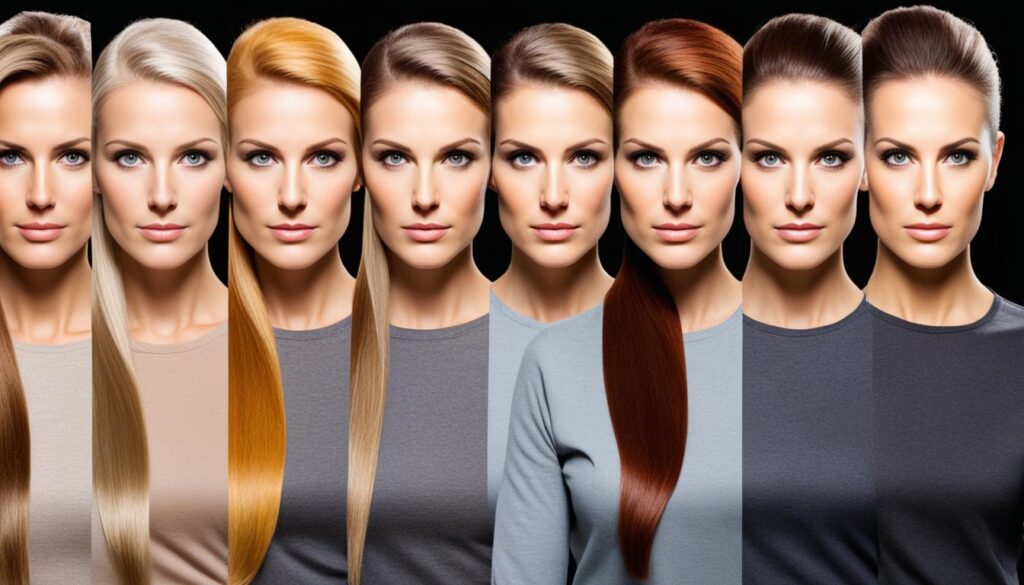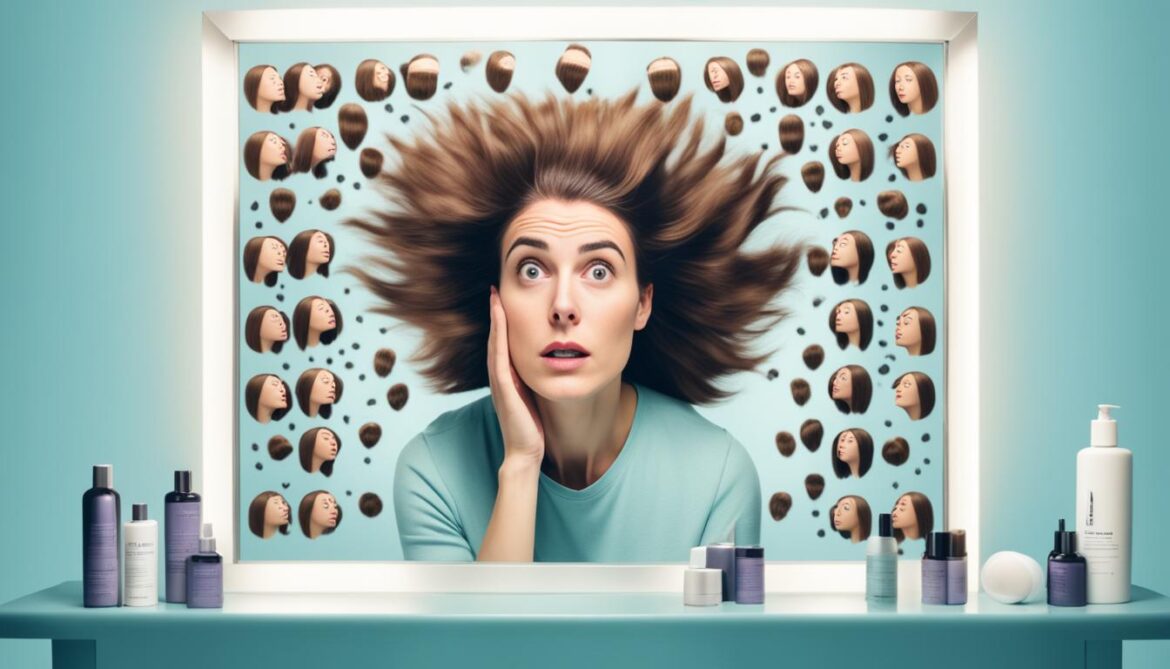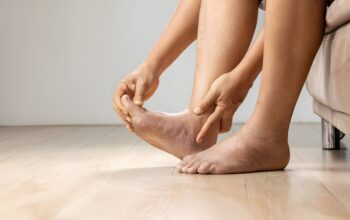Hair growth concerns can be frustrating for many individuals. If you find yourself wondering why your hair isn’t growing past a certain length, there could be several reasons behind this. Understanding the factors that affect hair growth and taking appropriate measures can help address these concerns and promote healthier hair.
Key Takeaways:
- Genetics, age, diet, and stress levels can impact hair growth.
- Each person has a specific hair growth cycle that determines the length their hair can reach.
- Maintaining a healthy hair care routine and making lifestyle adjustments can stimulate hair growth.
- Avoid over-processing, excessive heat styling, and aggressive styling practices to prevent hair breakage and stunted growth.
- Consistency and patience are key in overcoming hair growth challenges and achieving long, strong hair.
Genetics and Hair Growth
Your genetic makeup plays a crucial role in determining your hair’s growth pattern. Each person has a specific hair growth cycle, which can last between two and six years. This cycle is responsible for the length your hair can reach before it stops growing. Hair growth is not limited by a specific length but rather by the duration of the growth phase. Understanding your genetic predisposition can help you manage your expectations regarding hair growth and find ways to promote healthy hair growth.
To shed light on the connection between genetics and hair growth, let’s take a closer look at the hair growth cycle and the different phases involved:
| Phase | Description |
|---|---|
| Anagen | The active growth phase, lasting between two to six years. During this phase, hair follicles produce new cells, resulting in hair growth. |
| Catagen | The transitional phase that lasts for about two weeks. The hair follicles shrink, and hair growth comes to a halt. |
| Telogen | The resting phase that lasts for about two to three months. During this phase, hair follicles are dormant, and no new growth occurs. |
| Exogen | The shedding phase where old hairs are released, making way for new hair to grow. |
It’s essential to note that different individuals may have varying lengths of each phase, affecting their overall hair growth. While genetics play a significant role, other external factors such as age, diet, and stress levels can also influence hair growth.
Understanding how genetics and the hair growth cycle interplay can help you tailor your hair care routine and adopt effective practices to support healthy hair growth. By implementing nourishing hair care practices, such as proper cleansing, conditioning, and protecting your hair from heat and environmental damage, you can optimize your genetic potential for hair growth.
Now that we’ve explored the relationship between genetics and hair growth, let’s delve into the various factors that can affect hair growth in the next section.
Factors Affecting Hair Growth
When it comes to hair growth, several factors can make a difference. Understanding these factors and making lifestyle adjustments can help promote healthy hair growth. Let’s explore some of the key factors that can affect the growth of your hair.
The Role of Age
Age is a natural factor that influences hair growth. As we get older, the hair’s growth cycle becomes shorter, resulting in slower hair growth. While you can’t stop the aging process, you can take steps to maintain the health and vitality of your hair as you age.
The Impact of Diet
Diet plays a crucial role in hair growth. A lack of essential nutrients such as iron, vitamin D, zinc, B-complex vitamins, and collagen can impede the growth of your hair. Incorporating a balanced diet that includes these nutrients can provide the building blocks necessary for healthy hair growth.
The Connection Between Stress and Hair Growth
Stress, both emotional and physical, can have a detrimental effect on hair growth. High stress levels can disrupt the hair growth cycle and lead to hair loss. Finding effective stress management techniques and incorporating relaxation practices into your daily routine can help promote optimal hair growth.
By addressing these factors and making the necessary lifestyle adjustments, you can support healthy hair growth and achieve the luscious locks you desire.

Hair Breakage and Split Ends
Hair breakage and split ends are common causes for stunted hair growth. Various factors, including over-processing hair, excessive heat styling, aggressive styling practices, and poor hair care routines, contribute to these issues.
Over-processing Hair
Over-processing hair with chemicals like dyes, relaxers, and perms can strip the hair of its natural oils, leaving it weak and prone to breakage. These chemical treatments can cause damage to the hair shaft, leading to split ends and hindered hair growth.
Excessive Heat Styling
Aggressive use of hot tools, such as flat irons and curling wands, at high temperatures can damage the hair cuticle and lead to breakage. The excessive heat weakens the hair, causing it to become brittle and prone to splitting. It is important to use heat protectant products and minimize the use of hot tools to avoid further damage.
Aggressive Styling Practices
Brushing or combing the hair forcefully, especially when it is wet or tangled, can cause hair breakage. Wearing tight hairstyles like ponytails, buns, or braids regularly can also contribute to hair breakage along the hairline and the areas where the hair is pulled tightly. Opting for gentle detangling methods and avoiding overly tight hairstyles can help prevent breakage and split ends.
Poor Hair Care Routine
A lack of proper hair care routine, including inadequate moisturization, infrequent trims, and using harsh products, can lead to hair breakage and split ends. Neglecting to moisturize the hair properly can result in dryness and brittleness, making it more prone to breakage. Regular trims are essential for getting rid of split ends and promoting healthy hair growth. Using products with harsh ingredients or excessive chemicals can further damage the hair. Adopting a consistent hair care routine that includes moisturizing, regular trims, and using gentle and nourishing hair products is crucial for preventing hair breakage and split ends.
To promote hair growth and maintain healthy hair, it is important to avoid over-processing and excessive heat styling, practice gentle styling techniques, and adopt a proper hair care routine. By taking the necessary steps to prevent hair breakage and split ends, you can ensure that your hair grows longer, stronger, and healthier.
Conclusion
Promoting hair growth and maintaining healthy hair requires a holistic approach. While genetic factors and age play a significant role, there are several actionable steps you can take to address hair growth issues and improve the health of your hair.
Avoiding over-processing and excessive heat styling is crucial to prevent hair breakage and promote growth. Gentle styling practices, like using wide-toothed combs and avoiding tight hairstyles, can minimize damage and support healthy hair.
Another key factor to consider is your diet. Ensuring that you consume a balanced diet rich in essential nutrients, such as iron, vitamin D, zinc, B-complex vitamins, and collagen, can provide the building blocks necessary for strong and vibrant hair.
Furthermore, managing stress levels is essential for promoting healthy hair growth. Engaging in stress-reducing activities like mindfulness, exercise, and self-care can positively impact your hair’s growth cycle.
By implementing these healthy hair tips and customizing your hair care routine to fit your specific needs, you can overcome hair growth challenges and achieve the beautiful hair you desire. Remember, consistency and patience are key when it comes to nurturing your hair back to its optimal state.
FAQ
What are some reasons why my hair isn’t growing?
There could be several reasons for stunted hair growth, including genetics, age, diet, stress levels, shedding, and hair breakage.
How does genetics affect hair growth?
Your genetic makeup determines your hair’s growth pattern and the length it can reach before it stops growing. Understanding your genetic predisposition can help manage expectations and find ways to promote healthy hair growth.
What factors can affect hair growth?
Age, diet, and stress levels are factors that can impact hair growth. As we get older, the hair’s growth cycle becomes shorter. A lack of essential nutrients and high levels of stress can also hinder hair growth.
How does hair breakage and split ends affect hair growth?
Over-processing hair with chemicals, excessive heat styling, aggressive styling practices, and poor hair care routines can cause hair breakage and hinder hair growth. It’s important to avoid these practices and adopt a healthy hair care routine to promote hair growth.
How can I promote healthy hair growth?
Maintaining a balanced diet, managing stress levels, avoiding over-processing and excessive heat styling, and implementing a proper hair care routine can all contribute to longer, stronger hair. Patience and consistency are key in overcoming hair growth challenges.







